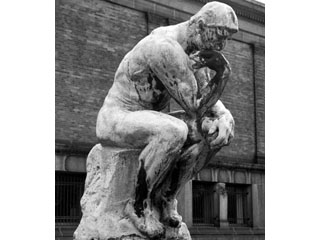Does Analytic Thinking Threaten Faith?

Introduction
A recent scientific study made the news, claiming that merely thinking analytically will tend to diminish one's faith. I for one was taken back by the study, since my full-time job (research scientist at Cedars-Sinai Medical Center) constantly involves analytic thinking and I have what I consider to be a strong faith. If it were true that a few minutes of analytic thinking could diminish one's faith, then one would expect that my 30+ years of such thinking would have utterly devastated my faith. Maybe something else was going on in this study?
Study design
Ara Norenzayan and Will Gervais from the University of British Columbia, Vancouver designed several ways they thought would put people in what they considered a more analytic mindset.1 In one experiment subjects viewed artwork depicting a reflective thinking pose (such as Rodin's The Thinker) while others viewed art depicting non-intellectual pursuits before answering questionnaires about their faith. In a second experiment half the subjects solved word puzzles that incorporated words such as "analyze," "reason," and "ponder," while the other half completed similar puzzles utilizing words unrelated to thinking, such as "high" and "plane." A third experiment required half the subjects to answer the religious questionnaire as usual, while the other half answered the same questionnaire printed in a hard-to-read font, which was supposed to promote analytic thinking. In all of these experiments, people who got the thinking-related cues or difficult to read questionnaires reported weaker religious beliefs compared to the control group.
Study flaws
If one reads just the article, it seems quite adequate. However, the devil is in the details. Much of the important information is found in the Supplementary Materials.2 The first problem is that the subject populations were not representative of average North American populations. Since most of the study subjects came from a liberal Canadian university, religious belief was highly underrepresented. In four of the five studies Christians represented less than one third of all participants, with the majority of unbelievers being atheists or agnostics. The Supplementary Materials admitted that there was a statistically significant effect of prior religious belief on the outcome of of the results. Other serious flaws could be found in the demographics. In four of the five studies, Asians represented over half of the participants. African Americans and Hispanics were completely absent from those studies. Females were highly overrepresented among study participants. For four of five studies, males represented only one quarter of study subjects. Since females tend to use intuitive mental processing more than males, the studies utilizing analytic thinking would be expected to produce stress for the majority of subjects. Study designers never considered the possibility that stress, rather than analytic thinking, might lead to disbelief in God (e.g., "God, why did you let me get into this situation?"). I would suggest that a study utilizing any non-analytic producer of stress would have, likewise, produced a significant "disbelief in God."

![]() The manuscript referees probably noticed at least some of the demographic
problems, since study authors added an online version of their studies
utilizing U.S.-recruited subjects. However, somehow they managed to recruit
non-representative populations even from this group, since only 26% were
male, and Christians represented only 56% (compared to 78% in the average
U.S. population3). Agnostics and atheists
comprised 10% and 16% respectively of this online population, while they
represent only 2.4% and 1.6% in the U.S. population as a whole.3
So, it is pretty clear that selection bias has occurred in the
implementation of this study.
The manuscript referees probably noticed at least some of the demographic
problems, since study authors added an online version of their studies
utilizing U.S.-recruited subjects. However, somehow they managed to recruit
non-representative populations even from this group, since only 26% were
male, and Christians represented only 56% (compared to 78% in the average
U.S. population3). Agnostics and atheists
comprised 10% and 16% respectively of this online population, while they
represent only 2.4% and 1.6% in the U.S. population as a whole.3
So, it is pretty clear that selection bias has occurred in the
implementation of this study.
Conclusion

Canadian psychologists Ara Norenzayan and Will Gervais have shown that when you take a group of female unbelievers and subject them to analytic tasks that their disbelief in God increases. I am not sure there is a story in that or that the results of this study can be applied to real populations of Americans. I would hypothesize that subjecting any population to a stressful task would diminish "belief" (i.e., more likely "trust") in God. Another important consideration left out of the study was the demographic information on the majors or kinds of jobs subjects were involved in. I would predict that people who regularly relied upon analytic thought in their daily lives would have zero change in belief in God when subjected to Norenzayan's and Gervais's studies. Subjecting intuitive thinkers to analytic tasks is likely to produce stress that might impact study results significantly.
Related Pages

-
 Why
are Christians So Stupid? - Does the Bible Teach Blind Faith?
Why
are Christians So Stupid? - Does the Bible Teach Blind Faith? - People of Faith - Famous Scientists
- Science and Faith Associations
- Did Albert Einstein Believe in a Personal God?
- Why are Most Scientists Atheists If There is Evidence for Belief in God?
References

- Will M. Gervais, W. M. and A. Norenzayan. 2012. Analytic Thinking Promotes Religious Disbelief. Science 336: 493-496.
- Supplementary Materials for Analytic Thinking Promotes Religious Disbelief by Will M. Gervais and Ara Norenzayan.
-
Statistics on
Religion in America Report, The Pew Forum, 2007.
Christianity Remains Dominant Religion in the United States, Gallup Poll, December 23, 2011.
http://www.godandscience.org/apologetics/analytic_thinking_faith.html
Last Modified May 18, 2012



